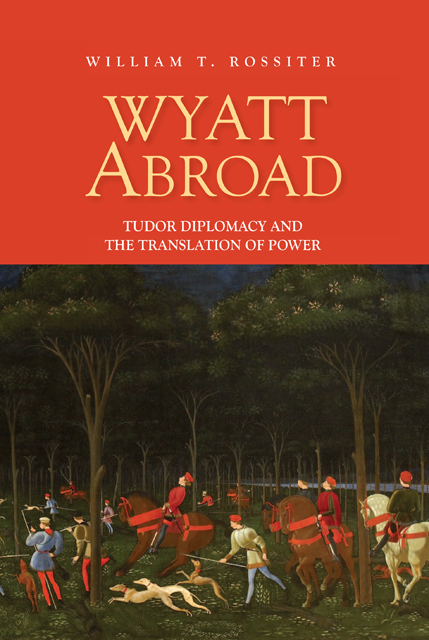Book contents
- Frontmatter
- Contents
- List of Illustrations
- Acknowledgements
- Note on Editions Used
- Abbreviations
- Introduction: The First Reformer?
- Chapter 1 ‘Sovendra du chaseur’: Wyatt in France, French at the English court
- Chapter 2 ‘My galy charged’: Wyatt in Italy
- Chapter 3 ‘So feble is the threde’: Wyatt in Spayne
- Chapter 4 ‘Inward Sion’: Wyatt in Jerusalem – The Penitential Psalms and Soteriological Diplomacy
- Conclusion: ‘In Kent and Christendome’: Wyatt in England
- Glossary of Rhetorical and Literary Terms
- Bibliography
- Index
Chapter 4 - ‘Inward Sion’: Wyatt in Jerusalem – The Penitential Psalms and Soteriological Diplomacy
Published online by Cambridge University Press: 23 February 2023
- Frontmatter
- Contents
- List of Illustrations
- Acknowledgements
- Note on Editions Used
- Abbreviations
- Introduction: The First Reformer?
- Chapter 1 ‘Sovendra du chaseur’: Wyatt in France, French at the English court
- Chapter 2 ‘My galy charged’: Wyatt in Italy
- Chapter 3 ‘So feble is the threde’: Wyatt in Spayne
- Chapter 4 ‘Inward Sion’: Wyatt in Jerusalem – The Penitential Psalms and Soteriological Diplomacy
- Conclusion: ‘In Kent and Christendome’: Wyatt in England
- Glossary of Rhetorical and Literary Terms
- Bibliography
- Index
Summary
THE DATING GAME
What has Wyatt’s translation of the Penitential Psalms to do with his diplomatic experience? The two most frequently proposed dates for the sequence – during or immediately following his imprisonment in 1536 or during his imprisonment in 1541, datings which extrapolate the theme of David’s self-imposed incarceration which recurs throughout Psalms 6, 32, 38, 51, 102, 130 and 143 – bookend the Imperial embassy. Wyatt could not have known that he would be sent on embassy so soon after his sojourn in the Tower following the downfall of Anne Boleyn, as he himself was alleged to have admitted:
theie [Bonner and Heynes] adde with all that I shulde wysshe the kinge had sent me to Newgatte when he sent me Embassadoure. I confesse franckly that I never bedged the office, and but for th’obediens to my master I wolde have vtterly refused yt.
If the 1536 retrodatazione is correct, Wyatt’s experience as ambassador to the Imperial court would not have been an immediate formative influence when translating the Psalms. However, Wyatt’s sequence would appear to have been influenced by the 1538 publication of Luther’s paraphrase upon the Penitential Psalms – Luther’s polyptoton, ‘sum Justus et justificatus per justum et justificantem Christum’ (‘I am just and justified by a just and justifying Christ’) is seemingly echoed by Wyatt’s ‘then forthwith justly able, / Just I am, jugd by justice off thy grace’ (454–5). Southall subsumes the Luther line into his revised dating of the Psalms’ composition, whereby he claims that the Psalms were not composed directly into Egerton but transcribed from an earlier draft: ‘On what evidence there is then, E does not contain the first draft of Wyatt’s Psalms. … Consequently, the composition of the Psalms could have begun as early as 1536, the echo of Luther’s commentary being the result of a later emendation, with Wyatt returning to the task in earnest in 1540, which appears the most likely date of their entry in E.’ However, Jason Powell’s analysis of the inks and watermarks in Egerton, as discussed in the previous chapter, helps us to formulate a post–1536 terminus a quo for the Penitential Psalms.
- Type
- Chapter
- Information
- Wyatt AbroadTudor Diplomacy and the Translation of Power, pp. 152 - 197Publisher: Boydell & BrewerPrint publication year: 2014



